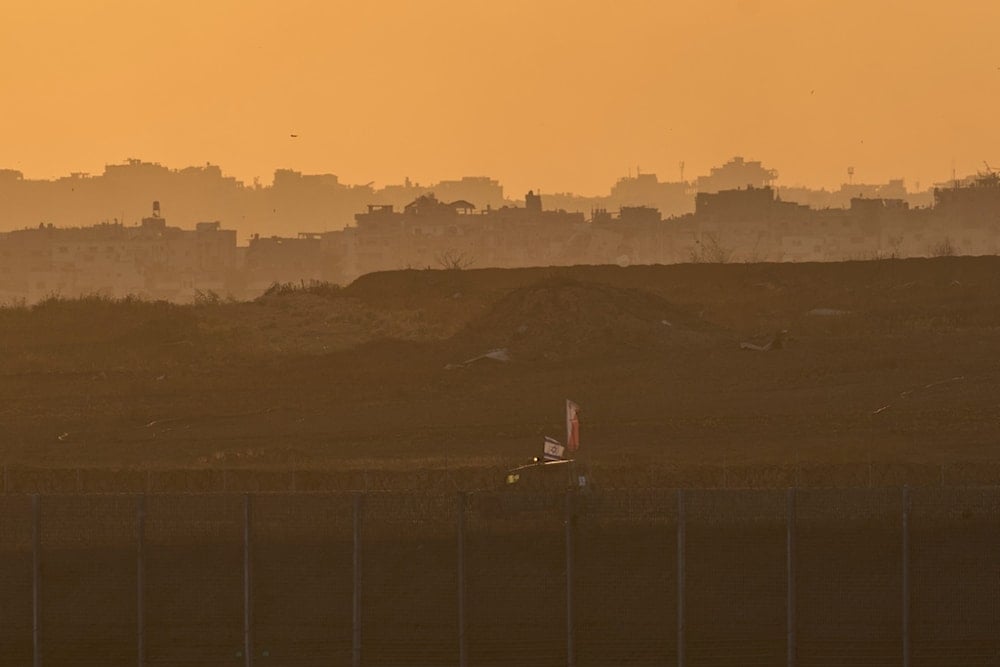Hamas rejects Witkoff ceasefire plan, says alters terms
Hamas rejects US envoy Witkoff’s new Gaza proposal, calling it an Israeli-dictated reversal of prior agreements as it offers only a 7-day ceasefire.
-

An Israeli army vehicle moves in the Gaza Strip as seen from southern occupied Palestine, Thursday, May 29, 2025. (AP)
Resistance affairs analyst Hani al-Dali told Al Mayadeen Thursday that the latest proposal from US Middle East envoy Steve Witkoff represents a complete reversal of the earlier framework previously agreed upon with Hamas.
In statements to Al Mayadeen, al-Dali dismissed reports claiming Hamas had accepted Witkoff's revised offer, calling them “inaccurate.” He emphasized that the new proposal was, in fact, a modified version drafted by Israeli Prime Minister Benjamin Netanyahu, aimed at replacing the earlier agreement with terms favorable to the Israeli occupation.
On another note, sources informed Al Mayadeen that reports claiming a press conference will be held tonight by Khalil al-Hayya, head of the Hamas movement in the Gaza Strip, are false.
This clarification follows media claims that al-Hayya was expected to speak on developments related to a potential ceasefire agreement between the involved parties.
In a statement posted on his official Facebook account, Bassem Naim, a member of the political bureau of Hamas, criticized the Israeli response to recent ceasefire proposals, describing it as a continuation of the occupation and a mechanism for prolonging suffering in Gaza.
Naim stated that the Israeli response "in essence, seeks to perpetuate the occupation, continue the killing and starvation, even during a temporary truce, and fails to meet any of the Palestinian people's core demands, especially the call to end the war and the humanitarian crisis."
Despite his strong criticism, Naim added that Hamas leadership is reviewing the proposal with "full national responsibility," indicating internal discussions are ongoing amid mounting international pressure for a ceasefire agreement.
Proposal pushes only 7-day truce
Al-Dali revealed that Witkoff's current proposal includes only a 7-day ceasefire, intended to extract the issue of prisoners from the hands of the Palestinian Resistance. He warned that while Hamas may issue a diplomatically worded response, the essence of its position remains a rejection of the new terms, describing the proposal as an Israeli-imposed attempt to force surrender.
He further noted that Witkoff had already circulated the proposal to regional states “as though it were a binding framework ready for signature,” and highlighted significant changes in the clause pertaining to military operations when compared to the earlier, more inclusive version.
Meanwhile, senior Hamas figure Basem Naim denied circulating reports that a press conference by senior official Dr. Khalil al-Hayya was scheduled for Thursday night.
Hamas acknowledges receiving proposal
Hamas announced earlier on Thursday that it had received a new ceasefire proposal for the Gaza Strip through mediators, which was submitted by Witkoff.
In its statement, the Palestinian resistance said it would study the proposal "responsibly," stressing its commitment to a deal that safeguards "the interests of the Palestinian people, provides relief, and secures a permanent ceasefire in the Strip."
The announcement came just days after Hamas had formally accepted a general framework for a ceasefire deal, also brokered by Witkoff, which includes a permanent halt to hostilities, a full withdrawal of Israeli occupation forces, unimpeded humanitarian aid, and the formation of a professional committee to oversee civil governance in the Strip.
Hamas announces review of proposal
The updated proposal appears to build on that framework with further input from Palestinian-American mediator Bishara Bahbah. According to sources familiar with the document, it outlines a 70-day ceasefire, a compromise between Hamas's proposed 90 days and the original 60-day version, during which 10 Israeli captives (five alive and five deceased) would be released in two batches. In return, a specified number of Palestinian detainees would be freed, under the supervision of international mediators.

 5 Min Read
5 Min Read










